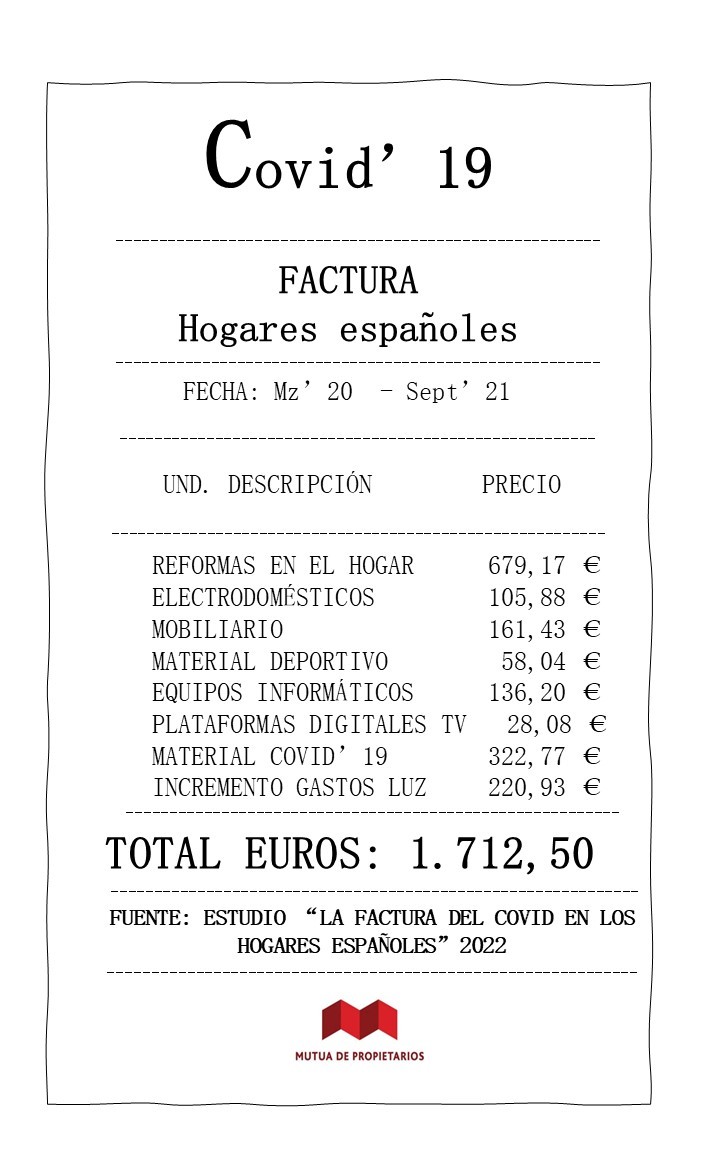Every time it seems to be closer or, at least, the end of the coronavirus pandemic is in sight.
The removal of indoor masks seems almost a reality, the return to almost complete normality, to that of before
Covid
, etc.
And with this you can begin to quantify how much the pandemic has cost.
According to the study
The Covid bill in Spanish households
, carried out by the
Mutua Owners Group
, a specialist in comprehensive solutions around real estate, carried out through a sample of more than 1,600 interviews, the average amount of the pandemic rose to
1,712.50 euros
, for expenses to meet the new needs arising from the coronavirus, both in adaptation of the home and in protection material.
"The
pandemic
has left a bill that, for some households, is easier to pay and has even allowed them to save and that, for others, has meant
an effort that makes them see the economic future in a more pessimistic way
," explains Laura López Demarbre, Group Strategy Director.
In fact,
The majority feeling (40%) is shown by those households that consider that there will be no improvement and that they feel insecure about the future.
The report, which analyzes the habits acquired during the pandemic and its economic impact, concludes that
1 in 3 households claims to come out of this "poorest" period
.
A situation that has been reached by the increase in expenses derived from
teleworking
(45%);
the
decrease in income
(37%);
the
increase in the rental price
(29%);
the
affectations by ERTE
(23%);
losses
in investments
(16%) or the
dismissal of a member of the household
(12%).
According to the report, when passing through the economic sieve the customs that have been incorporated as a result of the
pandemic
, we find a disparate vision depending on the household.
While habits such as
ordering food at home
;
television
platforms
or
intensive use of the internet
, have a perception of spending, others such as cooking or playing sports at home that are perceived as savings since the alternative, eating out or going to a sports center, means a higher amount.
"However, the great controversy is generated by
teleworking , which is seen in a similar way as savings or expenses since
the expenses generated by working at home
are put on the balance.
compared to the savings of commuting to the workplace", explains López Demarbre.
Taking these variables into account, the average bill that
Covid-19
has left in Spanish households between March 2020 and September 2021 finds its highest amount in the reforms (
€679.17
);
followed by protection materials against the virus (
€322.77
);
the increase in electricity costs (
€220.93
);
and the necessary furniture to adapt the environment (
€161.43
).
Although some of the expenses incurred during the health crisis would have been made in the same way - acquisition of household appliances or furniture - there are others whose trigger is closely linked to the new habits derived from the
pandemic
.
This is the case of contracting
digital platforms
(
€28.08
), the purchase of
sports equipment
(
€58.04
) or the
acquisition of computer equipment
(
€136.20
).
In this sense,
34% of households
have contracted television platforms during the pandemic, and
1 in 3 has invested in computer equipment
, equipping their households with the necessary technological tools to be able to interact virtually or to telework.
The report also analyzes the new habits adopted during the health crisis.
Specifically, 6 out of 10 people consulted say that, since the start of the
pandemic
, they relate more virtually;
61%
use the internet more
;
59% watch more digital platform television;
52%
cook more frequently
;
49% play sports at home;
41%
telecommute
;
and 39% ask for more food at home.
And for the future?
Working and playing sports at home or interacting virtually are considered habits that will disappear.
Cooking or watching television through digital platforms are the ones that are here to stay
, although, without a doubt, the curious case is that of food delivery: despite being perceived as a habit that generates spending, 82% of those surveyed sign that it will continue to do so, even to a greater extent.
Conforms to The Trust Project criteria
Know more
covid 19
Coronavirus

